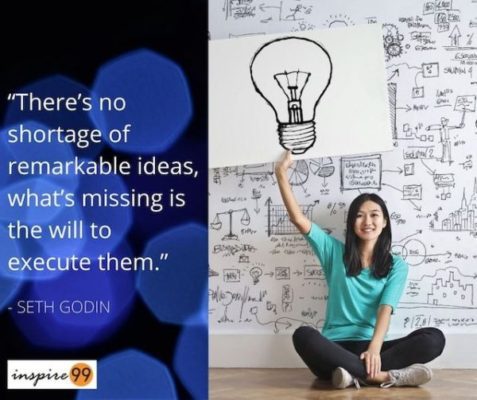No shortage of remarkable ideas: This article is inspired by Seth Godin’s quote – there’s no shortage of remarkable ideas. I’ve come across so many quotes which glorify the importance of an idea. Yes, ideas are important, but they’re only a starting point. We will spend a part of this article arguing on identifying how to turn these ideas into tangible value. A key piece of this is to identify if an idea is worth pursuing in the first place.
One of the most common examples we see is business ideas romanticised over a drink or on a piece of tissue. But an idea is much more than that. A good idea, engulfs you, creates an itch and makes it impossible to not act on it. Thankfully, there’s no dearth of great ideas – the execution is a beautiful exercise.
There’s no shortage of remarkable ideas, what’s missing is the will to execute them
– Seth Godin
How to know whether something is worth pursuing?
No matter what is said about an idea- it is still the birth place for a business. Nothing can start in vaccum, there has to be a spark which sets things in motion. For me, these are the thought processes about a problem. Going back to the basic business – there are two key motivators for a business idea:
- Pain: Is your idea solving a problem which someone is facing. Is the same problem being faced by a considerable subset of people?
- Pleasure: Can your idea make someone happy. This probably points itself to a lifestyle business, but equally the question is about whether it can bring someone pleasure.
An idea can manifest in multiple ways, but you would have to start from somewhere and maybe place it in a bracket. Once you have an idea, the next question is about testing the validity of an idea. One of the most popular ways to identify the worth of an idea is by objectively analysing it across the 4 categories below. I’d suggest leafing through – how to turn an idea into business for more information.

Reach of your idea: There is no shortage of remarkable ideas
It is great that you have an idea. A key question to follow this is – is this a problem faced only by you? The reason I ask is about the scale of an idea. If your idea can reduce pain only for a small set of people, an investor question will be – if the impact is low – how can you create a sustainable business?
If I were to pick a trick from the product management book for prioritization, I would refer back to the RICE methodology which says: Reach, Impact, Confidence and Effort (RICE). The formula says (Reach*Impact*Confidence)/(Effort). If the reach or impact to the outside world is low – the idea has a lesser ability to gain traction. This is not to say that it is a failure. It only means that getting an investor to look at your idea with interest and passion would be a difficult challenge.

Business Plans: Is my idea capable of growing into something more?
I keep coming back to the business plans. The reason being -these plans make you think. It simply cannot just be about ideas. There is certainly no shortage of remarkable ideas as Seth Godin highlights. If we start looking around – not all great business ideas out there are remarkable ideas. Some of them are very simple ones too. But they all have one thing in common – they are fulfilling a need in the market. (Read more: Key components of a business idea)
I’ve met a few entrepreneurs who consider business plans as a theoretical exercise. A common line of argument is that – it is going to change anyway. Personally, I fully agree with the change bit. But a business idea is not about the exact science of how you make every little thing work. It is about making you think about the different dimensions of an idea.
We’ve seen far too many business cases of failure where jumping straight in without a plan/strategy has backfired horribly. A business plan not only validates your idea but also forces you to think in dimensions which you might have failed to consider. It is not just about a remarkable idea, but the question of how you are going to make this work.
Simple ideas can make a difference.
Having said that, I would be inclined to bring the focus back – there is no shortage of remarkable ideas. The positive side is- as much as this means lots of competition, it also means that not everyone is going to work on their idea. It is never an easy journey to execute ideas and make them work.
It takes effort, commitment and sacrifices at the very least. Although a lot of people have brilliant ideas, a part of you can remain rest assured that even if your idea is not as remarkable, you may still be able to make it work. After all, execution is far more important than just a mere idea.
There’s no shortage of remarkable ideas, what’s missing is the will to execute them
– Seth Godin